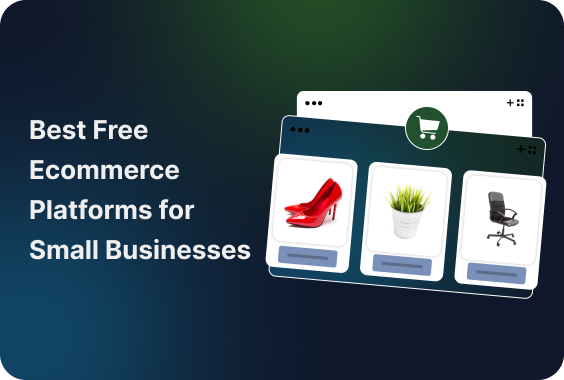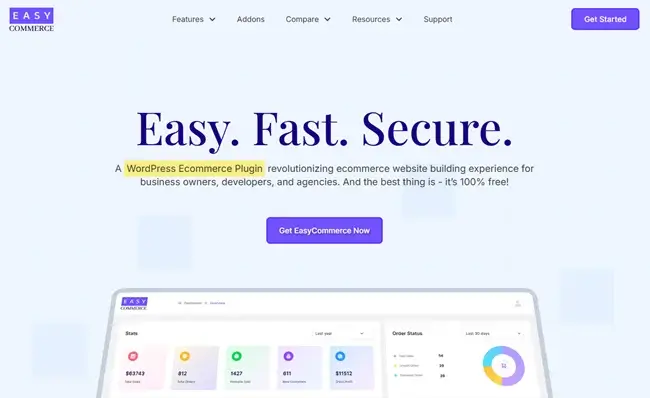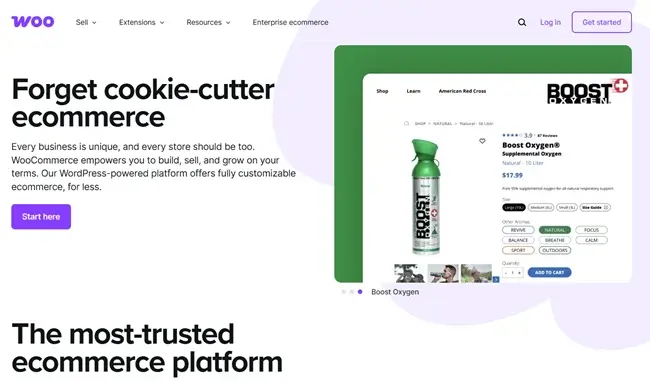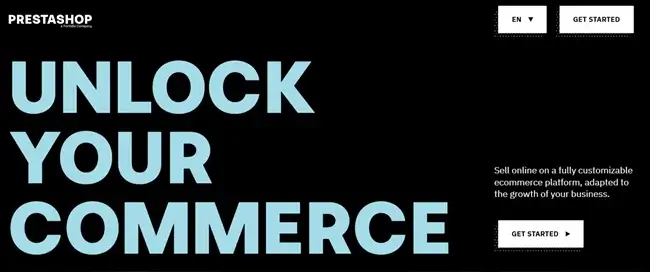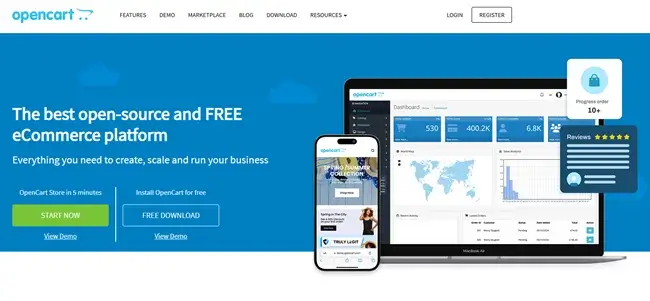Nowadays, more and more small ecommerce entrepreneurs are popping up. As per SellersCommerce, roughly 2,162 ecommerce websites were started each day between 2024 and 2025. A big chunk of these websites is built using at least one pre-built ecommerce platform. Here, the question arises: which are the best free ecommerce platforms for small businesses?
It’s wise to choose a free ecommerce platform when starting out. At the same time, free or lower-priced options surely help you invest more in ‘other important things’ during the early days of the business.
That’s why we’ve done our research and compiled a list of free ecommerce platforms that we believe are well-suited to small businesses. So, keep reading and find the ultimate free ecommerce platform for your small business right away.
7 Best Free Ecommerce Platforms for Small Businesses
Most eCommerce platforms will have their pros and cons, like literally. Choosing a platform that suits your small business’s requirements is a crucial decision for long-term growth.
Finding such a free platform is definitely a bonus; however, you must put aside some budget, if required. Following is our well-researched list of the top 7 best free ecommerce platforms to boost your small business.
1. EasyCommerce
If you’re an eCommerce entrepreneur looking for a complete solution without spending a dime, EasyCommerce is the name to know. It’s a modern, AI-powered, high-performance WordPress eCommerce plugin that delivers a simple yet intuitive experience while fulfilling all your online store needs.
You might be thinking, ‘Isn’t WooCommerce already doing this?’ Yes, but EasyCommerce does everything WooCommerce does, only better and smarter. What does ‘better’ mean? A cleaner interface, a more streamlined user experience, and lightning-fast performance, even when managing thousands of products, orders, and customers.
That speed comes from its smart architecture. Unlike WooCommerce, EasyCommerce stores products, orders, and customers in dedicated database tables, making it significantly more efficient under load.
Another major strength of EasyCommerce is that it barely has third-party dependencies. EasyCommerce doesn’t rely on external services to manage critical features like checkout, taxes, and shipping. And when you do want to extend it, there’s a growing library of addons built specifically for EasyCommerce.
All in all, it’s absolutely worth a try!
Additional Benefits of EasyCommerce:
- AI-assisted (read-generated) product summaries and descriptions.
- Add products with separately managed attributes for quicker reuse and faster listing.
- Comes with a CSV importer, WooCommerce, and SureCart migration addons for easy switching from other platforms.
- Offers built-in support for multi-level affiliate programs via WC Affiliate compatibility.
- Clean and focused admin dashboard built exclusively for easy store management.
- Free payment gateway addons like PayPal, Stripe for serving extended customer base.
- Taxes, Coupons, and Shipping are available by default and for free.
- Has developer-friendly hooks and filters for extending functionality.
- No surprise fees, and a simple tiered pricing plan based on the number of stores.
- All upcoming addons will be available in your current bundle, cost-free.
Some Notable Drawbacks:
- Smaller community compared to WooCommerce or Magento.
- Some advanced features require paid add-ons (like multi-language support).
- Still growing in terms of third-party theme and plugin compatibility.
- Not ideal if you’re building a non-WordPress site.
Pricing:
All core features of EasyCommerce are free to use. There’s no upgrade required. Even better, most of the additional plugins are available at no cost, too.
2. BigCartel
BigCartel is a dedicated and straightforward platform designed for artists. It is perfect to showcase and sell unique creations. If you prefer simplicity over complex design, this is your ideal platform. The interface is minimalist and offers a quick setup
With a forever-free plan supporting up to five products, BigCartel is cost-effective for small-scale sellers. The best part? It makes selling simple by giving you just the features you need – no extra drama, no confusion.
Additional Benefits of BigCartel:
- Mobile-responsive themes for on-the-go accessibility.
- Real-time sales dashboard to monitor store performance.
- Integration with popular payment gateways like PayPal and Stripe.
- Customizable templates to reflect brand identity.
- Inventory tracking to manage stock levels. (Platinum)
- Discount and promotion tools to attract customers. (Platinum)
- SEO-friendly URLs to enhance search visibility.
Some Notable Drawbacks:
- Limited scalability for growing businesses.
- Fewer integrations compared to competitors.
- The basic feature set may not meet advanced needs.
Pricing:
BigCartel has a free plan with basic features like a product limit (5 products) and a BigCartel-branded subdomain. Platinum ($15/month) and Diamond ($30/month) contain more features and flexibility.
3. Square Online
Square Online is great for small businesses that sell both online and in person. It’s integrable with Square’s POS system, so your inventory and sales stay in sync across all channels. The websites built with Square Online work really well on mobile devices. With this, it is perfectly suitable and simple to use for business owners as well as customers.
If you want to create a professional-looking online store without any coding knowledge, Square’s drag-and-drop website builder is perfectly suitable for you. It includes all the essential features for e-commerce platforms with support for multiple payment gateways.
Additional Benefits of Square Online:
- Automatic tax calculations to ensure compliance.
- Built-in SEO tools to improve online visibility.
- Integration with social media platforms for broader reach.
- Inventory management across multiple locations.
- Customer engagement tools like email marketing.
- Secure checkout with SSL encryption.
Some Notable Drawbacks:
- The free plan doesn’t let you have a custom domain.
- No sort of analytics is available in the free plan.
- Transaction fees apply even in the paid plans.
- Advanced features require upgrading to paid plans.
Pricing:
The main cost in the free plan is the payment processing fee of 2.9% + 30¢ for each online transaction. Paid plans with extended feature availability are Plus ($29/month) and Premium ($79/month).
4. WooCommerce
WooCommerce is one of the popular names that pop in whenever we talk about free ecommerce platforms. This tool, with over 8 million active installations, has shaped the online ecommerce space for multiple small businesses. Apart from being free, WooCommerce is an open-source platform. Thus, a user can develop it accordingly to match their unique needs.
Powered by the large WordPress ecosystem, WooCommerce is highly flexible and works with many themes and plugins. There are plugins for almost everything you can think of while starting and growing a small business.
In contrast to its free availability, while WooCommerce itself is free, most advanced features and add-ons often come at a cost.
Additional Benefits of WooCommerce:
- Wide range of payment gateway integrations.
- Comprehensive documentation and community support.
- Regular updates to enhance security and functionality.
- Support for digital and physical products.
- Advanced reporting/tracking/analytic tools for various insights.
- Mobile-friendly designs for accessibility.
- SEO optimization capabilities.
Some Notable Drawbacks:
- Requires some technical knowledge for setup and maintenance.
- Self-hosting can be hard to manage for some users.
- Performance may depend on hosting quality.
- Lack of compatibility between plugins can impact the website’s operation.
Pricing:
WooCommerce is free, but hosting and domain costs are separate. You’ll also need to pay for premium plugins, themes, third-party tools, and transaction fees when using payment gateways.
5. PrestaShop
PrestaShop is another famous free and open-source platform to build your ecommerce site. This tool has powered over 300,000 businesses and supports over 60+ languages. It also supports a long list of currencies, and thus, it is easy to set up your online store despite your location and preferred language.
You can add or remove features easily on this platform as per your needs. If you require flexibility and custom store functions, this platform is for you.
This tool is scalable as your business grows. It provides paid plans along with hosting. Thus, you can use the same platform even after your business grows. This offers high stability without switching platforms midway. This is a perfect tool if you’re ready to invest in your ecommerce business.
Additional Benefits of PrestaShop:
- Open-source with no licensing fees.
- Active community for support and development.
- Comprehensive analytics for performance tracking.
- Responsive themes for mobile compatibility.
- SEO-friendly features to boost search rankings.
- Integration with various payment gateways.
- Inventory management tools.
- Marketing tools like coupons and discounts.
Some Notable Drawbacks:
- Steeper learning curve for beginners.
- Some modules may require additional costs.
- Limited official support; relies on community forums.
Pricing:
PrestaShop is free and open-source (excluding domain, hosting, and paid modules). Hosted plans start at €24/month (excl. VAT) with a 14-day free trial. Enterprise solutions are available with custom pricing upon request.
6. OpenCart
If you’re looking for a lightweight solution, OpenCart is another ecommerce platform that would amaze you. It provides an efficient performance with its fast loading response time. If you’re a business seeking a straightforward solution, close your eyes and choose this tool.
One of the outstanding features of OpenCart is that you can manage multiple stores from a single admin interface itself. This is perfect if you want to operate multiple storefronts for different niches efficiently at once, from one tool.
Additional Benefits of OpenCart:
- Free to use with no monthly fees.
- User-friendly admin interface.
- Support for multiple languages and currencies.
- An extensive marketplace for added features.
- Built-in SEO tools to enhance visibility.
- Integration with various shipping platforms and payment gateways.
- Customizable templates.
- Detailed sales reports and analytics.
Some Notable Drawbacks:
- Extensions are somewhat pricey.
- Smaller community compared to other platforms.
- Some extensions may lack regular updates.
Pricing:
Similar to WooCommerce, the core OpenCart platform comes in entirely free. Add the cost of the domain, hosting, required extensions, and your storefront is ready to operate.
7. Magento 2
Magento was a major player in the early days of ecommerce platforms. Recognizing its potential, Adobe acquired it and rebranded the enterprise version as Adobe Commerce. You can explore its open-source version under its original name even today. However, the latest version of it is the Magneto 2.
With this ecommerce platform, you get a bunch of features like advanced security, regular updates, and compliance with industry standards. The product management is quite user-friendly. Magneto is a reliable choice with its familiar and secure interface.
Additional Benefits of Magento:
- Rich collection of extensions and themes.
- Multi-store management from a single dashboard.
- Advanced SEO capabilities.
- Comprehensive analytics and reporting tools.
- Support for various physical & digital product types
- Integration with numerous third-party services.
Some Notable Drawbacks:
- Requires significant technical expertise to install and operate.
- Community-based support may not always solve your issues.
- Higher hosting and development costs.
Price:
Magento Open Source is free. The enterprise version (Adobe Commerce) requires a custom-priced package from Adobe.
These are some of the top options for you to explore. But selecting any one from that list can also be hard. So here, I mention some factors that should help you find the right match.
Bonus: Use ARMember to Sell Membership Plans on WooCommerce
If you also want to sell memberships along with your products or sell memberships via the WooCommerce gateway, it is possible with ARMember. You can leverage ecommerce capabilities with ARMember in the following ways.
- WooCommerce Discount Addon for ARMember
Provide membership discounts based on varied rules. Set a global discount value or a fixed amount/percentage for specific products as per the membership plan owned by the member. You can also restrict WooCommerce products based on the membership plans owned by the members. - WooCommerce Payment Gateway Integration
With this, you can sell membership plans, paid posts, etc. Users can choose WooCommerce payment during checkout just like any other payment gateway. - WooCommerce Assign Plan to Products
Along with this integration, you get an option to assign any specific plan with a dedicated product in order to attract more sales.
Thus, with the powerful integration of ARMember with WooCommerce, you can assign a plan with a specific product purchase or even sell plans via the WooCommerce storefront.
Don’t Pick the Wrong Ecommerce Platform, Read This First
1. You don’t need to be a tech expert.
It is advised to use a platform that’s friendly even for beginners, has an intuitive setup, and can be managed easily on a day-to-day basis.
2. Free doesn’t always mean limited.
Look for platforms that offer solid features for free or at a low cost. It should match your tight budgets while being able to do the bare minimums.
3. Slow stores lose customers.
Your business won’t be the same ‘small’ in the coming days. That’s why the chosen platform should load fast and handle traffic smoothly, even as your store grows.
4. Start small, grow big.
Make sure the platform supports growth with upgrade options and integrations as your needs evolve.
5. Help when you need it most.
Reliable customer support and an active user community can save you time and frustration.
Final Verdict
Still unsure what to pick? Want a quick guide to help you decide? Firstly, identify your product type. Furthermore, compare the pricing plans and hidden costs of all the platforms that you shortlist. Then, lastly, take a look at the features and the scalability of the platform with your business vision.
If you ask for our recommendation, EasyCommerce is a clear winner in the WordPress arena. Its rich set of default features, combined with a completely free pricing model, makes it an excellent choice for small businesses.
That said, here are a few other great options based on specific needs:
- BigCartel: Perfect for artists and creators.
- Square Online: Ideal if you sell both online and in person.
- PrestaShop: Great if you prefer a modular design and frequent customizations.
Let us know your pick. We would love to hear your story of building a brand from scratch.
Read this also:
